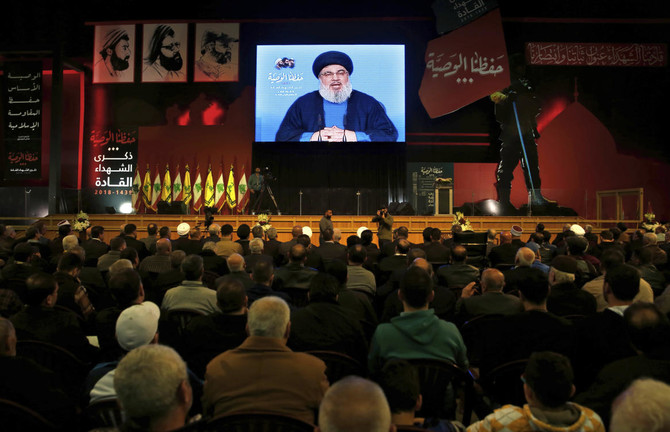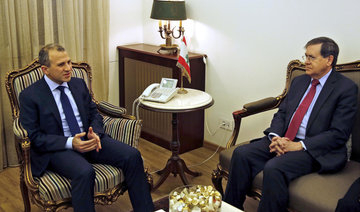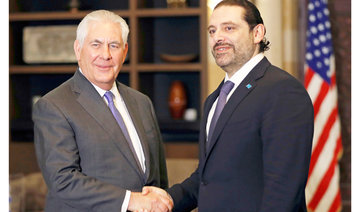BEIRUT: Hezbollah leader Hassan Nasrallah threatened Israel’s offshore energy projects Friday as he insisted his armed movement is Lebanon’s “only” source of leverage in an escalating oil and gas dispute.
“The only force you have, oh Lebanese, is the resistance,” Nasrallah said in a televised speech, referring to his powerful faction.
“If Israel threatens you, you can threaten it. If the Americans come tell you that you have to deal with them to hold Israel back, then tell the Americans: respond to our demands so we hold Hezbollah back from Israel,” he said.
Lebanon last week signed its first contract to drill for oil and gas in a pair of offshore zones, including one that its southern neighbor Israel says belongs to it.
The United States has sought to mediate the disagreement, with Acting Assistant Secretary of State David Satterfield meeting with top officials in Lebanon since February 6.
On Friday, Nasrallah said the US was not an “honest mediator.”
“They came to inform, dictate, and threaten,” he said.
Nasrallah’s comments come a day after US Secretary of State Rex Tillerson visited Beirut and blasted Hezbollah’s “destabilising” role in the region.
Tillerson said the US was “committed to helping Lebanon and the Lebanese people prosper through the development of their natural resources in agreement with all of their neighbors.”
A consortium comprising energy giants Total, ENI, and Novatek has pledged to begin drilling off of Lebanon’s coast by 2019.
Total has said that the dispute between Lebanon and Israel over “block nine” only covers eight percent of its surface area.
But Lebanese officials have said the whole zone belongs to Beirut, and Israeli Defense Minizer Avigdor Lieberman has insisted it is solidly in Israeli territory.
“The whole region has now openly entered into an oil and gas war, and our issue is not separate,” Nasrallah said on Friday.
“This is Lebanon’s wealth and hope... We are strong, and we must negotiate as such,” he said, stressing that any discoveries could usher in a “promising and different” future for Lebanese.
“If Lebanon’s Council of Defense takes a decision that oil platforms in Palestine should stop working, then in just a few hours, I promise you, they will stop working,” he threatened.
Hezbollah clashed with Israel in a month-long war in 2006 and is currently fighting alongside President Bashar Assad’s forces in neighboring Syria.
Syria’s protracted conflict has drawn in other world powers, including the United States, which has deployed boots on the ground as part of an international coalition fighting jihadists.
But Nasrallah criticized the US-led alliance on Friday, saying it was stationed in Syria to poach its oil wealth.
“They are staying at the Al-Tanf base east of the Euphrates River — why? Because the most important oil wells and gas (resources) in Syria are east of the Euphrates,” he said.
And US President Donald “Trump’s administation has oil in their eyes when they look” at neighboring Iraq, Nasrallah added.
Hezbollah says it is Lebanon’s ‘only’ tool in Israel gas dispute
Hezbollah says it is Lebanon’s ‘only’ tool in Israel gas dispute

Lebanon to extradite son of late Muslim cleric Al-Qaradawi to UAE, PM’s office says
Abdul Rahman Al-Qaradawi, an Egyptian-Turkish poet, was detained in Lebanon on Dec. 28 after returning from Syria, according to his lawyer Mohammad Sablouh and human rights group Amnesty International.
Youssef was stopped by Lebanese authorities on the basis of an Egyptian court ruling against him that dates back to 2016.
The arrest was made based on an Interpol notice issued by the Arab Interior Ministers Council based on the 2016 court ruling to imprison Youssef for three years on charges of spreading false news.
The UAE and Egypt have both filed requests for his extradition.
Qaradawi’s lawyer said he would file an urgent appeal to block his extradition on Wednesday morning but feared his client might be flown out of the country before then.
UN calls for $370m in new humanitarian aid for Lebanon

- Following nearly a year of exchanges of cross-border fire initiated by Hezbollah over the war in Gaza, Israel in September stepped up its bombing campaign and later sent troops into Lebanon
UNITED NATIONS, United States: The United Nations joined the Lebanese government on Tuesday to appeal for an additional $371.4 million in humanitarian aid for people displaced by the conflict between Israel and Hezbollah.
The extension builds on an initial aid appeal for $426 million launched in October, as all-out war flared between the two sides and sent hundreds of thousands in Lebanon fleeing their homes.
That appeal raised approximately $250 million, according to the UN.
Following nearly a year of exchanges of cross-border fire initiated by Hezbollah over the war in Gaza, Israel in September stepped up its bombing campaign and later sent troops into Lebanon.
After two months of warring, in which Hezbollah’s influential chief Hassan Nasrallah and multiple other leaders were killed, a ceasefire deal was reached that went into effect in late November.
“While the cessation of hostilities offers hope, over 125,000 people remain displaced, and hundreds of thousands more face immense challenges rebuilding their lives,” Imran Riza, the UN humanitarian coordinator in Lebanon, said in a statement Tuesday.
The additional funding “is urgently required to sustain life-saving efforts and prevent further deterioration of an already dire situation,” he added.
The appeal is primarily aimed to assist an estimated one million Lebanese, Syrian and Palestinian refugees affected by the conflict, funding a three-month period of emergency efforts through March 2025.
Since the ceasefire between Israel and Lebanon began on November 27, more than 800,000 displaced people in Lebanon have been able to return home, according to UN figures.
Qatar and Turkiye dispatch two power ships to generate electricity for Syria

- The vessels, which have power plants installed, are expected to increase the amount of electricity generated in the country by about 50 percent
- Syria’s energy infrastructure was badly damaged during the decade-long civil war, with most areas receiving power for only two or three hours a day
LONDON: Qatar and Turkiye sent two power-generating ships to Syria on Tuesday to help address the energy crisis in the country caused by insufficient electricity supplies.
Khaled Abu Di, the director of Syria’s Public Establishment for Transmission and Distribution of Electricity, said the floating power plants are capable of generating a total of 800 megawatts a day, which would increase the amount of electricity generated in the country by about 50 percent, state news agency SANA reported.
Syria’s energy infrastructure was badly damaged during more than a decade of civil war in the country that culminated in the fall of the ruling Assad regime in December. The deterioration resulted in severe power shortages, with many areas receiving electricity for only two or three hours a day.
Abu Di said efforts are underway to secure transmission lines to deliver the electricity generated by the ships. He added that his team is also working to repair dozens of damaged conversion plants and connection lines to get the national grid up and running again.
How Israeli law permitting child detention imperils the rights of Palestinian minors

- Under legislation passed in November by the Knesset, Israeli authorities are permitted to imprison Palestinians under the age of 14
- Rights monitors say Israel has detained some 460 children since the Oct. 7, 2023, Hamas-led attack triggered the Gaza war
DUBAI: Frightened, alone, and often injured during arrest, Palestinian children routinely find themselves vulnerable to abuses and deprived of basic rights after they are taken into Israeli custody, according to human rights monitors.
Under legislation passed in November by the Knesset, Israeli authorities are now permitted to detain Palestinians under the age of 14 — a measure that rights groups claim is motivated by revenge rather than security needs.
The bill, proposed by a member of Prime Minister Benjamin Netanyahu’s Likud party and approved by 53-33 votes, allows judges to sentence minors between the ages of 12 and 14 to prison terms if convicted of terrorist murder, manslaughter, or attempted murder.

According to the law, which was passed as a temporary measure lasting for five years, convicted minors can be held in closed facilities until they turn 14, after which they can be transferred to regular prisons.
An identical law, which was passed in 2016 following a series of attacks carried out by teenagers and other minors, expired in 2020.
According to the Palestinian Commission for Detainees and Ex-Detainees Affairs, Israel imprisoned more than 460 children between the months of October 2023 and January 2024.
INNUMBERS
460
Children imprisoned by Israel between October 2023 and January 2024, according to the Palestinian Commission for Detainees and Ex-Detainees Affairs.
16
Israeli courts have long defined the term ‘Palestinian child’ as a person under the age of 16, rather than the internationally recognized age of 18.
The Israeli parliament also passed a law in November that allows for the deportation of the family members of those convicted of attacks on Israeli citizens.
Furthermore, it allows for the deportation of the family members of those who had advance knowledge and either failed to report the matter to the police or “expressed support or identification with an act of terrorism.”

Relatives of those who published “praise, sympathy or encouragement for an act of terrorism or a terrorist organization” can also be deported.
“This is a historic and important day for all citizens of Israel,” Itamar Ben Gvir, Israel’s national security minister, said in a statement welcoming the bill, which he said “sends a clear message the State of Israel will not allow the families of the terrorists to continue enjoying life as if nothing had happened.
“From today onwards, every father, mother, child, brother, sister or spouse who identifies with and supports their family member who harmed the citizens of Israel will be deported.”

Both Israel’s Justice Ministry and the Attorney General’s Office raised concerns about the legislation, which stipulates that those being expelled would be sent to Gaza or other destinations for 7-15 years for citizens or 10-20 years for legal residents.
Some opposition members of the Knesset suggested at the time that the legislation is targeted specifically at Palestinian citizens of Israel, saying the law is unlikely to apply to Jewish Israelis convicted of terrorism offenses.
Israeli and Palestinian human rights organizations have branded both new laws unconstitutional.

Hadeel Abu Salih, an attorney working for Adalah, the Legal Center for Arab Minority Rights in Israel, sent a letter to the Israeli parliament claiming the legislation was motivated by revenge and retribution.
Abu Salih also said the legislation contradicts the principles of Israel’s Youth Law, which stresses rehabilitation over punitive measures for minors.
The Legal Center released a statement saying that “through these laws, Israel further entrenches its two-tiered legal system, with one set of laws for Jewish Israelis under criminal law and another, with inferior rights, for Palestinians under the pretext of counterterrorism.

“By embedding apartheid-like policies into the law, the Knesset further institutionalized systematic oppression, in contravention of both international law and basic human and constitutional rights.”
Since the Oct. 7, 2023, Hamas-led attack on southern Israel that triggered the Gaza war, Israeli forces have significantly increased the rate of arrests of Palestinian children, both in Gaza and the West Bank.
Between October and November 2023 alone, 254 minors were reportedly arrested by Israeli forces. Some of these detainees have since been released.

The bulk of the arrest operations appear to take place in towns, camps, and other areas with points of contact with Israeli checkpoints. Although the precise charges leveled against these minors are unknown, the most common offense is throwing stones.
In some cases, rights monitors say children under the age of 10 are taken in order to pressure their relatives to surrender themselves to Israeli authorities.
Palestinian children released from Israeli detention often describe traumatic experiences, recounting harsh measures enforced by guards and the prison administration, including allegations of physical and psychological torture during interrogation.

Testimonies shared with Save the Children include severe beatings in the presence of their relatives, being shot at, having their legs restrained, and being blindfolded during transfers between detention centers.
Several claim that food and water were also withheld for long periods of time as a form of punishment. Some have even alleged sexual abuse. Monitors say minors are routinely denied their right to legal aid and at times the presence of a family member during their interrogations.
As a result of these abuses, minors are allegedly coerced into signing false confessions and into signing documents without understanding their content. Children are also rarely granted bail before standing trial.
The Palestinian Commission for Detainees and Ex-Detainees Affairs and the Palestinian Prisoners Society have expressed concern about the ongoing detention of children and the alleged abuses.
Both say the behavior of Israeli prison administrations and conditions inside overcrowded facilities have become worse since the Oct. 7, 2023, attack.
Monitors say the detention centers holding minors do not meet the minimum humanitarian standards. A large number of detained children are reportedly sharing cells and are deprived of an education, medical assistance, and personal items such as books and clothing.
Israeli courts have long defined the term “Palestinian child” as a person under the age of 16, rather than the internationally recognized age of 18 as defined by the Convention on the Rights of the Child.
Israeli authorities have previously denied the maltreatment of detainees.
Responding to separate claims by the UN in March last year about the alleged mistreatment of adults captured in Gaza, the Israel Defense Forces told the BBC: “The mistreatment of detainees during their time in detention or whilst under interrogation violates IDF values and contravenes IDF and is therefore absolutely prohibited.”
Francesca Albanese, the UN special rapporteur for Palestine, accused the international community of failing to address the detention of Palestinian children, saying minors in Israeli custody are “tormented often beyond the breaking point.”
On World Children’s Day, marked by the UN on Nov. 20, the Palestinian Commission for Detainees and Ex-Detainees Affairs released a statement saying that around 270 Palestinian children were being held in Israeli jails.
“The occupation continues to detain no less than 270 children, who are mainly held in Ofer and Megiddo prisons, in addition to camps established by the occupation army after the Gaza war,” the commission said.
“Systematic crimes are being committed by the prison administration against the jailed children, in addition to beatings, torture, and daily abuses.”
According to Palestinian rights monitors, more than 11,700 people from the West Bank have been detained since October 2023. This does not include those from the Gaza Strip, where the number of arrests is thought to be far higher.
Similarly, the Ministry of Foreign Affairs of the Palestinian Authority urged the international community on World Children’s Day to pressure Israel to honor its commitments to global treaties, especially the Convention on the Rights of the Child.
It stressed the need to ensure Palestinian children are not excluded from international charters that call for special protections for children against violence and detention.
The ministry also condemned the law undertaken by the Knesset to detain children under the age of 14 years, calling it a dangerous escalation that further undermines Palestinian children’s rights.
Despite international and local human rights organizations calling for the abolition of the Knesset’s child detention laws, the Israeli government insists the law will remain in place for the next five years.

Germany pushing for EU to relax sanctions on Syria, sources say

- This requires an unanimous EU decision
- Germany’s foreign ministry declined to comment
BERLIN: Germany is leading European Union discussions on easing sanctions imposed on the Syrian government of toppled President Bashar Assad and aiding the country’s population, foreign ministry sources said on Tuesday.
“We are actively discussing ways to provide sanctions relief to the Syrian people in certain sectors,” one of the sources said. This requires an unanimous EU decision.
Germany’s foreign ministry declined to comment.
A lightning rebel offensive overthrew Assad on Dec. 8 and Islamist rebels Hayat Tahrir Al-Sham (HTS), which led the advance, set up a caretaker government.
The US on Monday issued a six-month sanctions exemption for transactions with some government bodies to ease the flow of humanitarian assistance, address Syria’s power shortages and allow personal remittances.
The EU, United States, Britain and other governments imposed tough sanctions on Syria after Assad’s crackdown on pro-democracy protests in 2011 spiraled into civil war.
HTS has renounced its ties with Al Qaeda but is still designated a terrorist entity by the United Nations and US
German officials first circulated thoughts on easing sanctions on Syria in documents sent to Brussels before Christmas.
The FT first reported on Tuesday that the documents outline how the EU could gradually ease restrictions on Damascus in return for progress on social issues, including safeguarding minority and women’s rights and upholding commitments to ensuring non-proliferation of weapons.
The FT, citing an unnamed source familiar with the EU discussions, added that, like Washington, the bloc could make any easing of sanctions temporary to ensure that it could be reversed if necessary.
German Foreign Minister Annalena Baerbock on Friday traveled to Syria for a one-day trip with her French counterpart on behalf of the EU and met with HTS leader Ahmed Al-Sharaa.
Baerbock said during her visit that all Syrian groups including women and Kurds must be involved in the country’s transition if Damascus wants European support.


















